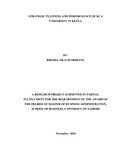| dc.description.abstract | Strategic Planning is an important ingredient for organizational growth, development performance and change Management. Managers make decisions on a day to day basis that directly affect organizational performance in a negative or positive way. It’ been noted that firms who have successfully incorporated strategic planning, experience superior performance compared to those that do not embrace the practice. The Strategic Planning Process involves four main steps. These steps include: strategy formulation, strategy implementation, external and internal analysis, plus evaluation and control. The main objective of this study was to investigate the effect of strategic planning on the performance of KCA University Kenya. The study was conducted through a case study of KCA University. Primary as well as secondary data sources were used for the study. The data was obtained by use of in-depth together with interactive interviews of 11 management staff at the University. Secondary data was also collected from other sources to support the primary data. The nature of data collected was qualitative and therefore analyzed using content analysis. The study established that strategic planning at KCA University (KCAU) was mainly done through the Quality Assurance department with assistance from external consultants in consultation with top management. The leadership of KCAU had a clear vision to be acknowledged as a leading business university of Choice whose graduates proficiently and assertively serve Kenya as nation, East Africa, and the Globe at large. While their mission statement is “to offer high quality market driven teaching, research and extension services in a safe and supportive academic environment”. The study established that the challenges facing the organization included resistance to the strategic planning process from members of staff, lack of synchronization between the strategic plan and departmental and individual staff work plans, lack of understanding of the strategic plan amongst members of staff as well as staff not working well together. The study concludes that KCA University’s strategic plan reaffirms KCAU’s commitment “to be recognized as a premier business university of Choice whose graduates competently and confidently serve the nation of Kenya, East African Region and the Global Community”. The study recommends that the process should be inclusive of all employees and that the University and various departments should conduct regular evaluation of the strategies and the same be communicated to staff. Management should also effectively budget for the process and increase the budgetary allocation for the same. This study has various implications in the higher education sector, to KCA University and to academicians in interested in strategic planning. The study provides an insight on various factors players in the higher education sector need to consider in their strategic planning process as well as recommendations for strengthening the relationship between performance and strategic planning in higher educational institutions. This investigation also provides additional areas of study and research gaps for academicians in strategic planning and individual researchers | en_US |



